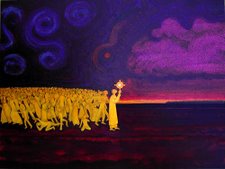"The emerging [Christian] thought is a self-acknowledged form of heresy insomuch as it is aware of its failure to describe that of which it speaks. This recognition acts as an effective theological response to fundamentalism, as it unsettles the dark heart of its self-certain power. Very briefly, fundamentalism can be understood as a particular way of believing one's beliefs rather than referring to the actual content of one's beliefs.
"It can be described as holding a belief system is such a way that it mutually excludes all other systems, rejecting other views in direct proportion to how much they differ from one's own. In contrast, the a/theistic approach can be seen as a form of disbelieving what one believes, or rather, believing IN God while remaining dubious concerning what one believes ABOUT God (a distinction that fundamentalism is unable to maintain). This does not actually contradict the idea of orthodoxy but rather allow us to understand it in a new light...
"This a/theism is not then some temporary place of uncertainty on the way to spiritual maturity, bur rather is something that operates within faith as a type of heat-inducing friction that prevents our liquid images of the divine from cooling and solidying into idolatrous form."
Thursday, December 13, 2007
Subscribe to:
Post Comments (Atom)



No comments:
Post a Comment